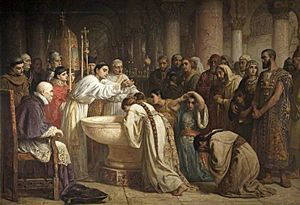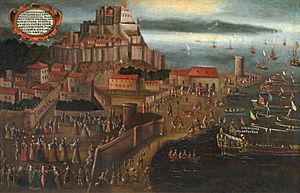Oran fatwa facts for kids
The Oran fatwa was an important Islamic legal opinion given in 1502. It was created to help Muslims in Spain who were forced to become Christians. This happened between 1500 and 1502 in a part of Spain called the Crown of Castile.
The fatwa gave special rules that allowed these Muslims to act like Christians on the outside, even if they still believed in Islam. This was so they could survive. It explained how they could still do their prayers, give to charity, and perform ritual washing, even if they couldn't do them perfectly. It also gave advice for times when they had to break Islamic rules, like going to Christian worship, saying things against Islam, or eating pork and drinking wine.
This fatwa was very popular among Muslims and Moriscos (Muslims who had to pretend to be Christian) in Spain. One copy of the fatwa, translated into a special Spanish language written with Arabic letters (called Aljamiado), was made 60 years after the original. Experts say the fatwa was a "key document" for understanding how Spanish Muslims practiced their faith after the Christian reconquest of Spain, up until they were finally expelled.
The person who wrote the fatwa was Ahmad ibn Abi Jum'ah, a Muslim scholar from North Africa. Modern scholars call it the "Oran fatwa" because the author's name included "Al-Wahrani," which means "from Oran." However, this fatwa was mostly important in Spain. Outside of Spain, most Muslim scholars believed that Muslims should leave a country or even choose to die if they couldn't practice their religion properly.
Quick facts for kids Oran fatwa |
|
| Created | 1 Rajab 910 AH (c. 8 December 1504 CE) |
| Location | Extant copies (including translations) kept in:
|
| Authors | Ahmad ibn Abi Jum'ah |
Contents
History of Muslims in Spain
Islam arrived in Spain in the 700s. By the 1100s, about 5.5 million Muslims lived there. They called this land "Al-Andalus." Over the next few centuries, Christian kingdoms in the north slowly took back control of Spain. This process was called the Reconquista.
By the late 1400s, the number of Muslims in Spain had dropped. The last Muslim kingdom, Granada, fell in 1492. At first, when Christian rulers took over, they often promised Muslims freedom to practice their religion. For example, the Treaty of Granada promised rights like religious tolerance.
Forced Conversions
However, things changed. In Granada, Muslims were forced to convert to Christianity. This led to rebellions between 1499 and 1501. After these rebellions were put down, Muslims in Granada lost their rights. They were given a harsh choice: become Christian, be enslaved or killed, or leave Spain.
Leaving was very hard for most families. It was difficult to move to Muslim lands in North Africa. Many couldn't afford the fees to leave, and authorities often made it harder for them. So, for many, the only way to survive as Muslims was to pretend to be Christian in public.
By 1501, almost all Muslims in Granada had officially converted to Christianity. This "success" led to similar forced conversions across other parts of Spain in 1501 and 1502. These new converts and their children were called Moriscos. They had to accept Christianity and give up Islamic practices. They were also pressured to act like Christians, such as going to church and sending their children to learn Christian teachings. They even had to eat foods like pork and drink wine, which are forbidden in Islam.
Who Wrote the Fatwa?
The copies of the fatwa that still exist have slightly different names for the author. But they all point to Ahmad ibn Abi Jum'ah al-Maghrawi al-Wahrani. Sometimes, the name 'Ubaydallah is added, which means "the little servant of God."
The part of his name, al-Wahrani, means "from Oran." Oran is a city in modern-day Algeria. Because of this, the author is often called "the Mufti (legal expert) of Oran," and the document is called "the Oran fatwa." However, it's not clear if the fatwa was actually issued in Oran.
A scholar named Devin Stewart believes the author was Abu al-Abbas Ahmad ibn Abi Jum'ah al-Maghrawi al-Wahrani. He was a legal scholar who studied in Oran and another city called Tlemcen. He likely wrote the fatwa in Fez, Morocco, where he was a professor.
Al-Wahrani wrote the fatwa because Muslims in Christian Spain asked for legal advice. They wanted to know if they could continue living there. The fatwa was written around December 8, 1504.
What the Fatwa Said
The fatwa showed great understanding for the Muslims in Spain. It recognized their suffering and the risks they faced for keeping their faith. The author encouraged them to hold onto Islam and teach it to their children.
The fatwa explained that Spanish Muslims still had to perform their daily prayers (salat), give to charity (zakat), and do ritual washing (ghusl). But it said they could do these things even if they couldn't follow the exact rules.
- Prayers: Normally, prayers involve standing, bowing, and kneeling. The fatwa said it was okay to pray by just making small movements. If they couldn't pray at the right times, they could make up the missed prayers at night.
- Washing: If clean water wasn't available for ritual washing (wudu), they could do a "dry ablution" (tayammum) using clean earth or stone. If even that wasn't possible, just pointing their hands or face towards clean earth was acceptable.
- Charity: They still had to give charity (zakat), even if it was just by being generous to a beggar.
- Full Body Wash: The fatwa said the full body ritual wash (ghusl) was still required, "even though by plunging into the sea."
The fatwa also allowed Muslims to take part in Christian rituals and worship on the outside. But they had to believe in their hearts that these actions were wrong.
- Christian Worship: If they had to bow to Christian "idols," they should secretly intend to perform their Islamic prayer. They should focus their thoughts on Allah, not the idol.
- Forbidden Actions: If they were forced to say things against Islam, like cursing Prophet Muhammad or saying Jesus was the son of God, they should do it. But they should try to secretly change the meaning. For example, they could mispronounce Muhammad's name or intend to curse someone else with a similar name.
- Forbidden Food and Drink: The fatwa allowed them to eat pork and drink wine, which are normally forbidden. But they should not enjoy these things and should reject them in their hearts.
- Marriage: A Muslim man could marry a Christian woman because both Muslims and Christians are considered "People of the Book." But a Muslim woman should avoid marrying a Christian man unless she was forced. Even then, she should believe in her heart that it was forbidden.
At the end, the author invited Muslims to write to him if they had more questions. He wanted to give them more legal advice.
How the Fatwa Changed Things
The fatwa became very important for Muslims and Moriscos across Spain. It was copied and translated for over a century. It helped shape how Moriscos practiced Islam until they were expelled from Spain between 1609 and 1614.
This led to a new way of practicing Islam. What mattered most was a person's inner intention (niyya), not just following all the outward rules. Many Moriscos were born and lived their lives with this understanding of their faith. Some Morisco writings even describe how secret Muslims used Christian worship as a substitute for Islamic rituals, just as the fatwa suggested.
However, the fatwa's influence stayed mostly within Spain. Outside of Spain, most Muslim scholars still believed that Muslims should leave a country or even choose to die if they couldn't openly practice their religion.
Images for kids
See also
 In Spanish: Fetua de Orán para niños
In Spanish: Fetua de Orán para niños
 | John T. Biggers |
 | Thomas Blackshear |
 | Mark Bradford |
 | Beverly Buchanan |




